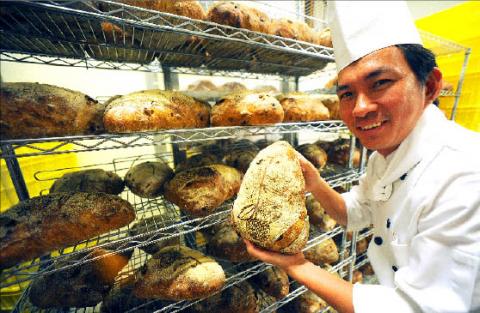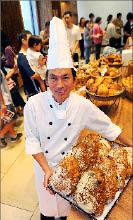As a boy in the countryside, Wu Pao-chun (吳寶春) often had to eat leftovers, but today he is a world-famous baker and a driving force in a culinary revolution sweeping the country.
Wu, 42, won the bread section in the prestigious Bakery Masters in Paris last year, to much fanfare back home, and now his loaves sell like hot cakes in a society more accustomed to steamed buns.
“I have very strong attachment to baking. To me, bread is art, much more than just food,” Wu said in an interview.

Photo: Sam Yeh, AFP
It is an art with a growing number of connoisseurs among Taiwan’s 23 million, judging from sales at his bakery in Greater Kaohsiung.
Every day, he and his assistants bake 300 loaves of his trademark bread filled with lychee, and a similar amount of bread with longan. They are snatched up before they grow cold.
Wu, who has written two books, is featured in several TV programs shown on lifestyle channels across the world and customers from as far away as the US ask to have their pictures taken with him.

Photo: Sam Yeh, AFP
It is a success that has not come easily to Wu, whose father’s death in a traffic accident forced his mother to bring up eight children in abject conditions.
“Very often, when she was hungry, she would get vegetables or leftovers from family and neighbors,” Wu said, the memory bringing tears to his eyes.
At the age of 15, Wu went to Taipei to start an internship at a bakery, but found life hard and unrewarding as his school had left him a functional illiterate with not even basic calculating skills.
The turning point came when he joined the army as a conscript and a friend taught him how to read. This kindled a thirst for knowledge, and he traveled to Japan to hone his baking skills with masters in the field — it was during the Japanese colonial era beginning 1895 that Japan introduced bread to Taiwan, albeit in a soft version that did not have hard crusts.
“For decades, people in Taiwan preferred soft bread rather than the European-style hard-crusted bread, but the taste has gradually changed,” he said.
Hard-crusted bread now accounts for about 30 percent of the bread consumers buy in Taiwan — a transformation that Wu has helped to bring about.
The path from illiterate farm boy to world-class baker was not an obvious one given his background — most of Wu’s siblings are factory workers or housekeepers — and he knows exactly who to thank for his success.
“The most important influence bringing me where I am today is my mother. She never gave up and never bowed to pressure, no matter how poor our family was,” he said.
Wu’s bond with his mother is a captivating story in a society where respect for the elderly might be dwindling, and famed local movie director Lin Cheng-sheng (林正盛) plans to shoot a film about the baker and his mother next year.
Despite having made it further than most in his profession, Wu sees no reason for complacency. And having no obvious rivals does not relieve him of the pressure to perform.
“My only real competitor is myself. I know if I want to keep growing, I have to force myself to think in new ways all the time,” he said.

The Chinese Communist Party (CCP) is pushing for residents of Kinmen and Lienchiang counties to acquire Chinese ID cards in a bid to “blur national identities,” a source said. The efforts are part of China’s promotion of a “Kinmen-Xiamen twin-city living sphere, including a cross-strait integration pilot zone in China’s Fujian Province,” the source said. “The CCP is already treating residents of these outlying islands as Chinese citizens. It has also intensified its ‘united front’ efforts and infiltration of those islands,” the source said. “There is increasing evidence of espionage in Kinmen, particularly of Taiwanese military personnel being recruited by the

ENTERTAINERS IN CHINA: Taiwanese generally back the government being firm on infiltration and ‘united front’ work,’ the Asia-Pacific Elite Interchange Association said Most people support the government probing Taiwanese entertainers for allegedly “amplifying” the Chinese Communist Party’s propaganda, a survey conducted by the Asia-Pacific Elite Interchange Association showed on Friday. Public support stood at 56.4 percent for action by the Mainland Affairs Council and the Ministry of Culture to enhance scrutiny on Taiwanese performers and artists who have developed careers in China while allegedly adhering to the narrative of Beijing’s propaganda that denigrates or harms Taiwanese sovereignty, the poll showed. Thirty-three percent did not support the action, it showed. The poll showed that 51.5 percent of respondents supported the government’s investigation into Taiwanese who have

Left-Handed Girl (左撇子女孩), a film by Taiwanese director Tsou Shih-ching (鄒時擎) and cowritten by Oscar-winning director Sean Baker, won the Gan Foundation Award for Distribution at the Cannes Critics’ Week on Wednesday. The award, which includes a 20,000 euro (US$22,656) prize, is intended to support the French release of a first or second feature film by a new director. According to Critics’ Week, the prize would go to the film’s French distributor, Le Pacte. "A melodrama full of twists and turns, Left-Handed Girl retraces the daily life of a single mother and her two daughters in Taipei, combining the irresistible charm of

South Korean K-pop girl group Blackpink are to make Kaohsiung the first stop on their Asia tour when they perform at Kaohsiung National Stadium on Oct. 18 and 19, the event organizer said yesterday. The upcoming performances will also make Blackpink the first girl group ever to perform twice at the stadium. It will be the group’s third visit to Taiwan to stage a concert. The last time Blackpink held a concert in the city was in March 2023. Their first concert in Taiwan was on March 3, 2019, at NTSU Arena (Linkou Arena). The group’s 2022-2023 “Born Pink” tour set a